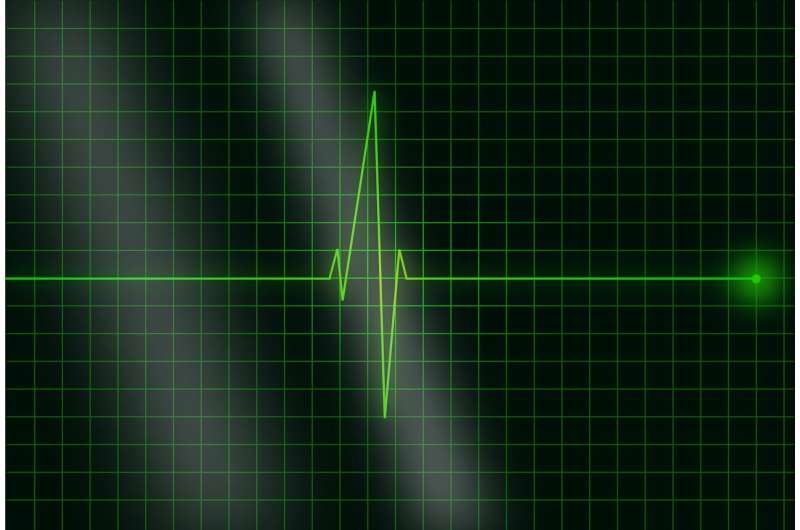Focused update of heart failure guidelines published

A focused update of the European Society of Cardiology (ESC) Heart Failure Guidelines is published online today in European Heart Journal following the results of major new trials that should change the management of patients with heart failure.
“Heart failure is a fast-moving area of research and exciting new trials are expanding the treatment options for patients,” said Guidelines task force chairperson Professor Theresa McDonagh of King’s College Hospital, London, UK. “This focused update incorporates the latest evidence-based treatments into state-of-the-art management recommendations with the aim of improving the outcome of patients with heart failure.”
Chronic heart failure is a condition in which the heart can no longer pump blood around the body as well as it should. It typically occurs because the heart has become too weak or stiff. Ejection fraction, meaning the proportion of blood that is ejected when the heart pumps, is a measure of cardiac function that is used to categorize the types of chronic heart failure. Acute heart failure is life-threatening and requires urgent treatment; it can be the first manifestation of heart failure but is more often due to an acute deterioration of chronic heart failure.
Guidelines task force chairperson Professor Marco Metra of the University of Brescia, Italy said, “In 2021, the ESC published Guidelines for the diagnosis and treatment of acute and chronic heart failure. Since then, more than 10 randomized controlled trials have been released that should change patient management ahead of the next scheduled full guideline, necessitating a focused update. New recommendations are provided in three areas: chronic heart failure, acute heart failure, and comorbidities.”
Regarding chronic heart failure, in the 2021 Guidelines there were no recommendations on the use of sodium–glucose co-transporter 2 (SGLT2) inhibitors in patients with heart failure with mildly reduced ejection fraction (HFmrEF) and heart failure with preserved ejection fraction (HFpEF) as no trials had been conducted in these groups. Since then, the EMPEROR-Preserved trial and the DELIVER trial were conducted with the SGLT2 inhibitors empagliflozin and dapagliflozin, respectively. The focused update recommends an SGLT2 inhibitor (dapagliflozin or empagliflozin) in patients with HFmrEF and HFpEF to reduce the risk of heart failure hospitalization or cardiovascular death.
The 2021 Guidelines emphasized the importance of pre-discharge and early post-discharge assessment in patients admitted to hospital for an episode of acute heart failure. Following that, the STRONG-HF trial showed the safety and efficacy of starting oral medical therapy, and achieving optimal doses, before hospital discharge and in early follow-up visits post-discharge. Based on these results, the focused update recommends an intensive strategy of initiation and rapid up-titration of evidence-based treatment before discharge and during frequent and careful follow-up visits in the first six weeks after hospitalization for heart failure to reduce readmission and mortality.
The focused update stresses that during follow-up appointments, particular attention should be paid to symptoms and signs of congestion, blood pressure, heart rate, NT-proBNP plasma concentrations, potassium concentrations, and estimated glomerular filtration rate (eGFR, an indicator of kidney function). These factors are linked with prognosis and can signal the need for further changes in treatment.
Turning to comorbidities, the focused update provides two new recommendations for the prevention of heart failure in patients with chronic kidney disease and type 2 diabetes. Based on the results of the DAPA-CKD and EMPA-KIDNEY trials, and a meta-analysis of four trials, the focused update recommends SGLT2 inhibitors for patients with chronic kidney disease and type 2 diabetes to reduce the risk of heart failure hospitalization or cardiovascular death. The second recommendation follows the FIDELIO-DKD and FIGARO-DKD trials and a pooled analysis of the two studies. The focused update recommends the MRA finerenone for patients with type 2 diabetes mellitus and chronic kidney disease to reduce the risk of heart failure hospitalization.
The second comorbidity addressed in the focused update is iron deficiency. The results of new trials including IRONMAN, plus meta-analyses, have led to new recommendations in the focused update. Intravenous iron supplementation is now recommended in iron deficient patients with heart failure with reduced ejection fraction (HFrEF) or HFmrEF to improve symptoms and quality of life, and should be considered to reduce the risk of heart failure hospitalization.
More information:
Theresa A McDonagh et al, 2023 Focused Update of the 2021 ESC Guidelines for the diagnosis and treatment of acute and chronic heart failure, European Heart Journal (2023). DOI: 10.1093/eurheartj/ehad195
Journal information:
European Heart Journal
Source: Read Full Article
